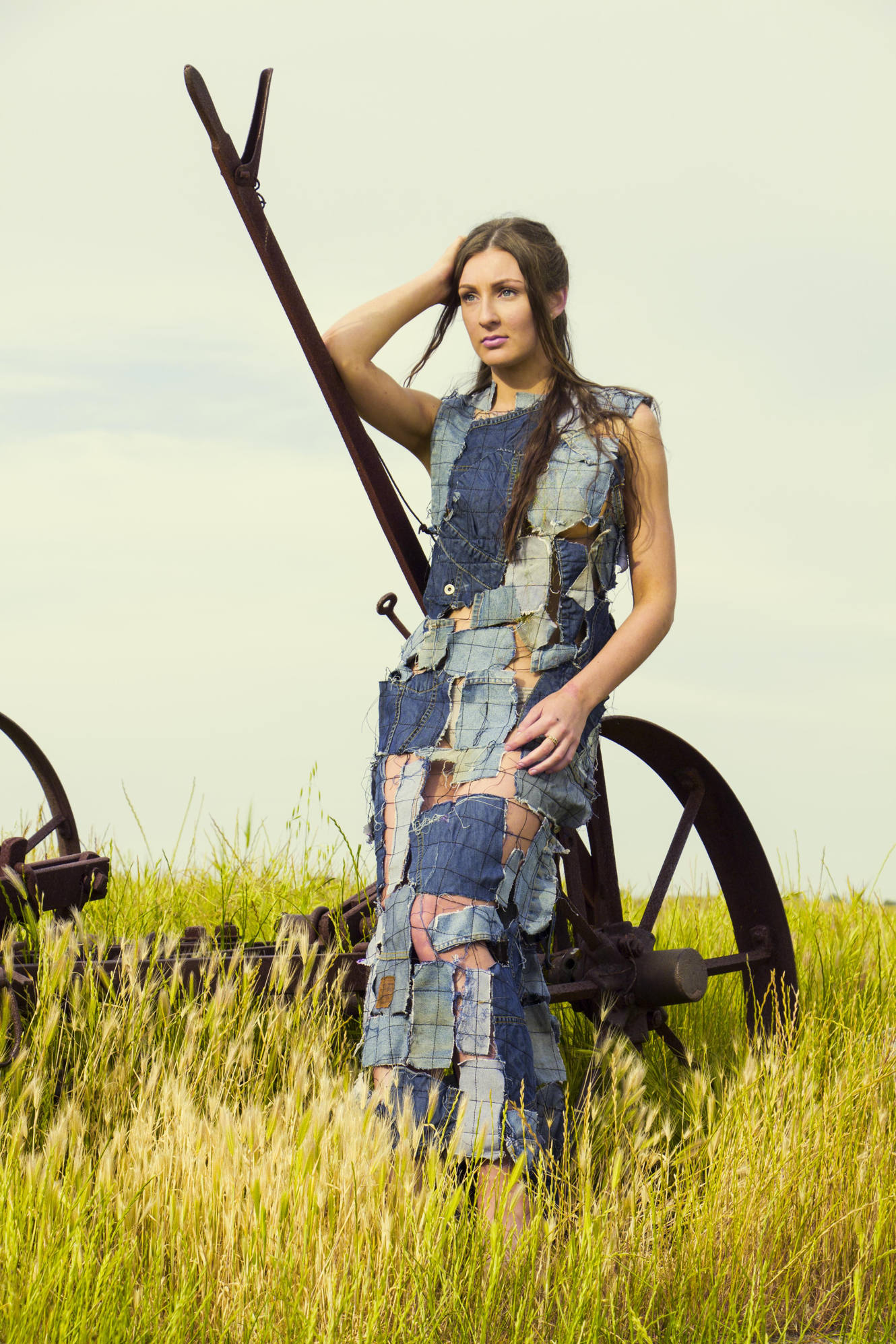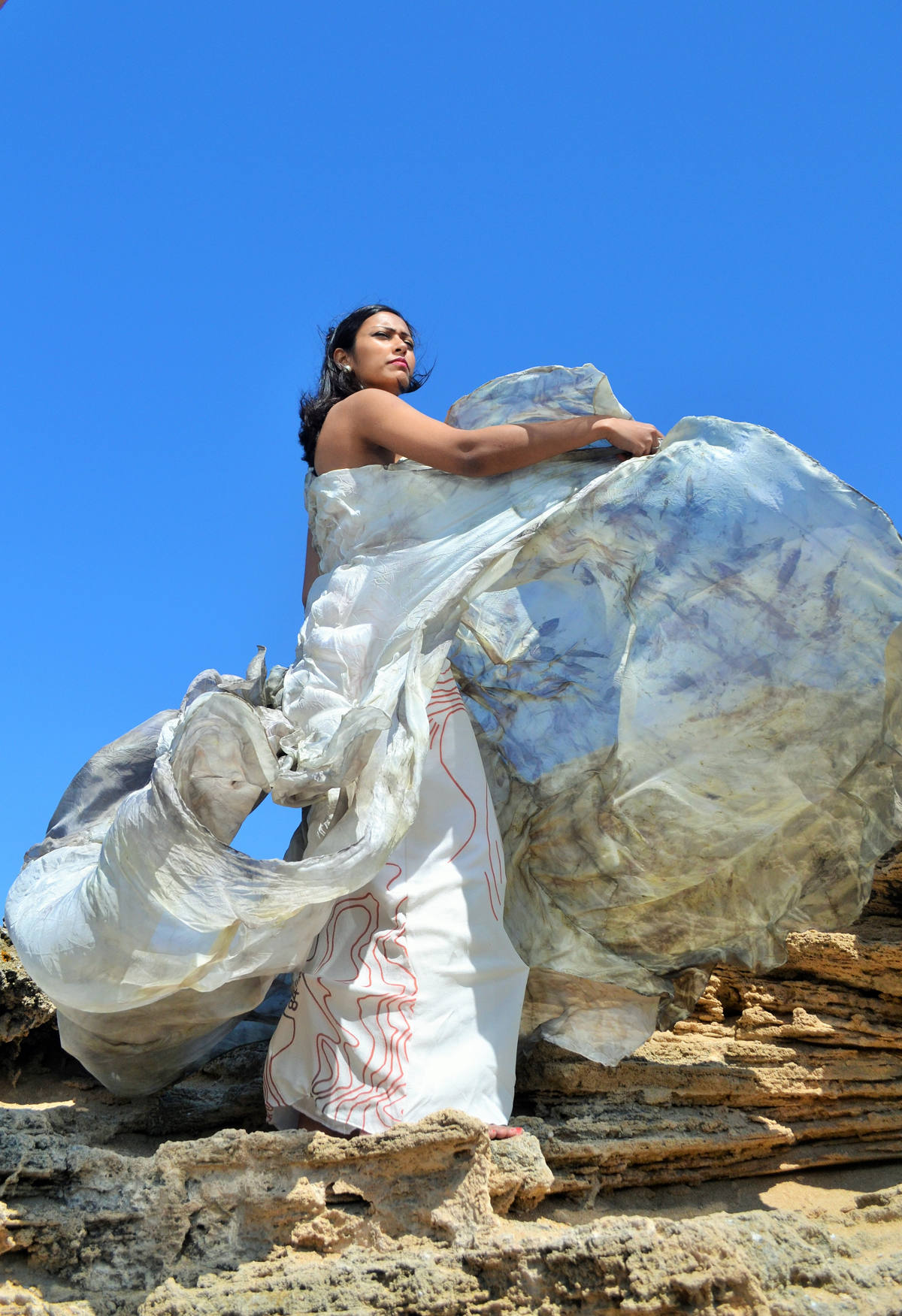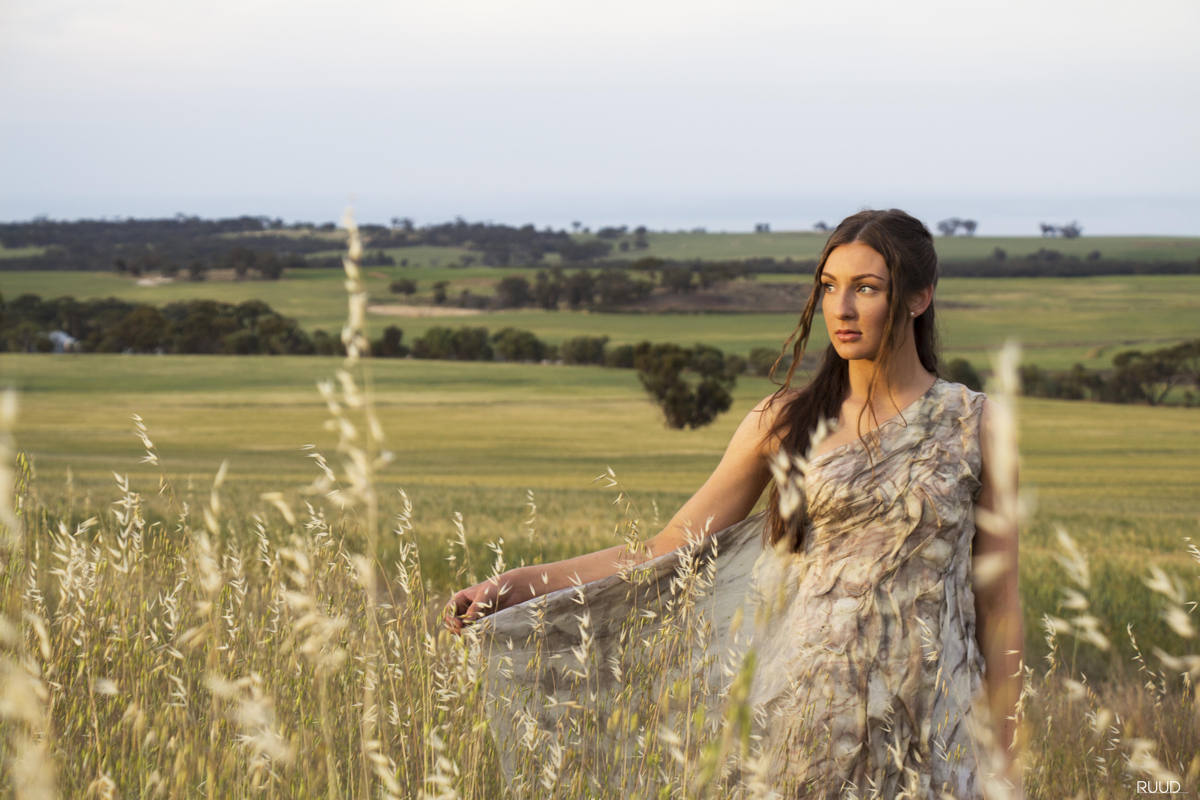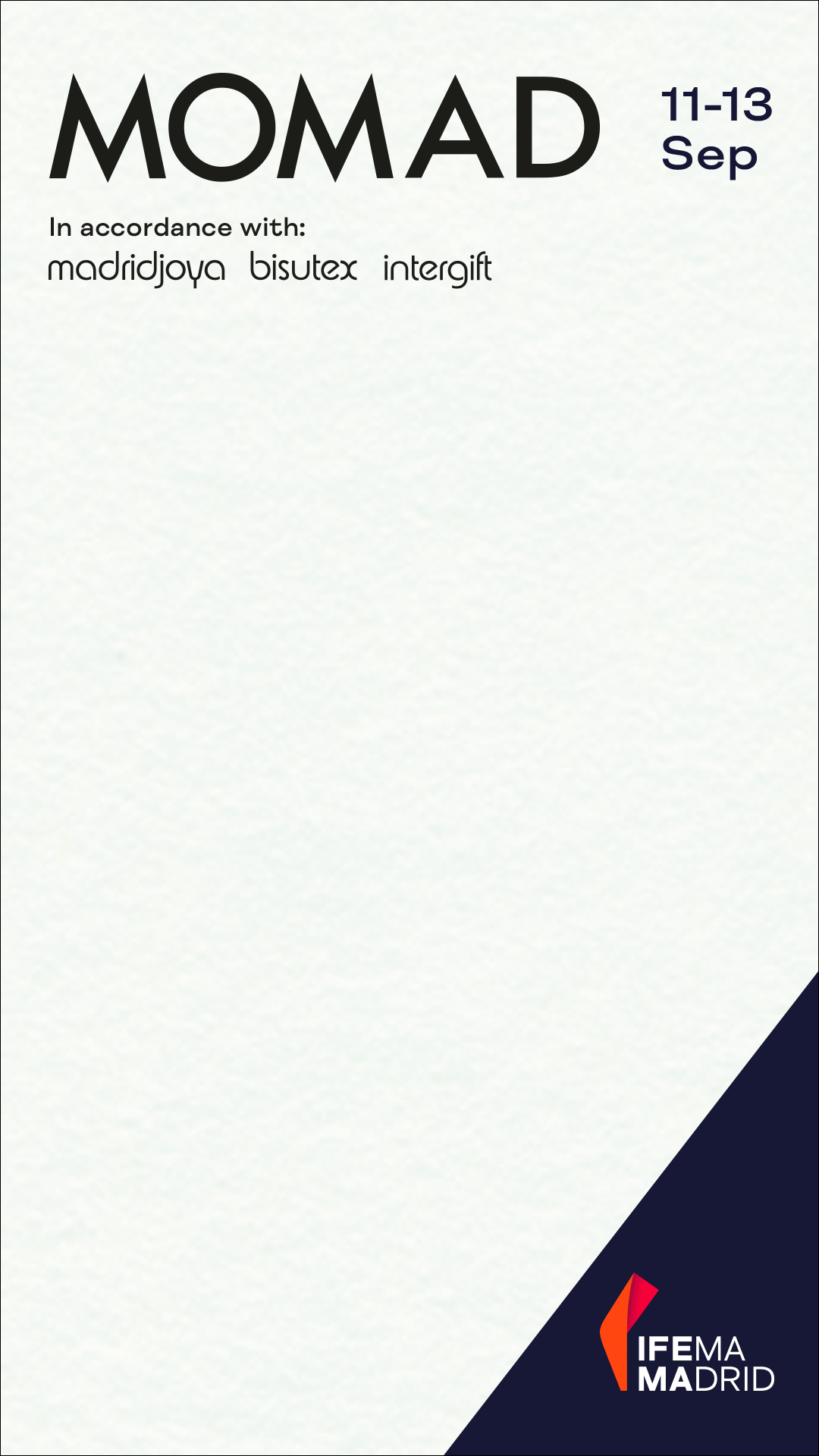Fabric of Nature and the beauty of eucalyptus leaves
The young designer Tayla Parnham created the eco fashion label Fabric of Nature by combining her passion for the environment and her love of sewing. The result: some of the most unique and beautiful natural garments Worldwide.
Tayla Parnham studied a double degree in Bachelor of Science with focus on Environmental Science and a Bachelor of Arts in Fashion and Textiles. By studying in two very different fields, she looked at connecting science and art together. Currently working as environment advisor focusing on environment Management, Tayla Parnham is the founder of eco friendly fashion label Fabric of Nature. Her love for the environment, understanding the natural sciences behind it, is the “core” of the label. Fabric of Nature lets her communicate messages about looking after the environment appreciating the natural beauty of it. “I work a lot with fragile tissue silks that, when dyed with eucalyptus leaves, creates the most unique and beautiful natural colours. When turned into garment it is appreciated and seen more by others. By using eco friendly and biodegradable fabrics, I also feel like I am doing my part to help minimising the clothes that are going to landfill as my clothes at the end of their life time can breakdown naturally in the environment and provide nutrients to grow new plants”.
“I am really interested in manipulating the fabrics with different textiles processes through natural dying with eucalyptus leaves, where the leaf prints directly transpose onto natural fabrics”.


Love at first sight
Tayla learnt to sew when she was a child. Her grandmother taught her everything she knows about sewing. From then on she was designing and making her own clothes. She enjoyed it. It allowed her to make something no one else had. Throughout school, she really enjoyed experimenting with different textile techniques, particularly felting wool and dying fabric. “When I found the natural dying technique at University, I found something that was meaningful to the ideas I wanted to portray through clothing. My love for the outdoors and the natural environment led the inspiration for my label. As an emerging designer now I am looking at all the different ways through clothing I can promote and make people aware, apart of being environmentally conscious”.
The last collection designed by Tayla, showed during last Eco Fashion Week Australian runway, was about portraying an appreciation for the natural environment with a particular focus on Western Australia and how humans fit in with the environment. The materials used were a lot of raw silks naturally dyed with eucalyptus leaves, recycled workwear -particularly denim and flannel shirts-, and other organics such as linen and cotton.
“Consumers need to understand where and how their clothes are made to get a better appreciation for the art of construction and the time it takes to make quality items”.
“I utilise deconstruction techniques by deconstructing and reworking old used clothes and upcycle them into something new. The designs are inspired by mirroring the garment as a landscape themselves. You may notice some of my pieces feature topographic maps looking at the lay of the landscape from different perspectives as well as patterns from native bushland of the leaves”.
Tayla is currently selling hand naturally dyed silk scarves. Growing up with a family farm in the wheatbelt of western Australia, she also has been exposed a lot to sheep and merino wool which has been an addition to her label this year.
Difficult times or challenger times?
We all know the most difficult things with working in the eco fashion space is the limited availability of raw organic fabrics and materials to use. Currently we live in a fast fashion world that heavily focus on unsustainable synthetic clothes that are mass produced and contribute to massive amounts of landfill waste. To Tayla, the worst part about the current fashion system is still about the end goal of making mass productions of clothes for high profit with no consideration for the environmental and ethical costs. “The market is still favouring cheaper synthetic mass produced clothes over local products, ethically produced or made with organic fabrics. It needs to shift. I think the saddest news about fashion at the moment are the current statistics of the percentage of mass produced products, mainly synthetics clothing, going into our landfills. There seems to be also less and less local produced textiles where particularly the wool industries are declining as they are being outcompeted by synthetic clothes”.
“The difficult aspects of the eco fashion world is trying to educate others on the importance of biodegradable fabrics that are not dyed with artificial chemicals and are not mass produced in unethical factories”.


Consumers need to change
“Consumers need to change the way they buy clothes as it is becoming more and more unsustainable to go on like this any further. Consumers can change the way they buy clothes by understanding the processes of what goes into making the clothes and the ecological footprint that is created (ie. emissions produced, can it biodegrade?…). Consumers need to understand where and how their clothes are made to get a better appreciation of the art of construction and the time it takes to make quality items. I encourage consumers to educate and get better understanding of the clothing they buy… For instance do they need it? Have they done any research about where the products come from or what they are made out of? Can it be bought second hand instead? Is it an eco friendly fabric that will biodegrade over time? Am I buying a local product or is it mass produced in a factory? Is what I am buying high quality and made to last?…”
“Do not be afraid to push your ideas and stay true to what you believe in and don’t let anyone change or influence your style or label. Try to not get overwhelmed by it all and build up the collection in the label slowly. It pays to have meaning behind your ideas that you are passionate about as that passion gets transferred to garments and becomes rewarding over time.”
A sustainable way of living
Tayla says she does not really buy specific labels. “I like to wear items that I have found in op shops. I also buy from local boutiques/ markets and love to practice clothes swaps with family and friends. I look for items for my wardrobe that are made from natural fibres mainly”.
She tries to make conscious eco friendly decisions throughout her lifestyle such as minimising plastic usage by finding alternatives like stainless steel straws and bees wax paper, recycling household items properly and trying to minimise her ecological footprint by walking instead of driving. Working in the environmental sciences, she also get to be envolved in a lot of environmental initiatives to protect the environment and conservate it.
Books, Films and more…
The designer likes to read books about natural dying fabrics that show how these amazing colours can be extracted from natural environment but also from everyday fruits and vegetables. “I have been reading “The Modern Natural Dyer: A Comprehensive Guide to Dyeing Silk, Wool, Linen and Cotton” by Kristine Vejar; “Eco Colour: Environmentally Sustainable Dyes”, by India Flint. I have also been reading “The Influencer” by Kerry Patterson. It is not so much an eco book but does shed light on how we can influence and make a positive change in people and I am interested in how this could be applied to influencing people to being more environmentally friendly and promoting sustainable clothing”.
Sustainable lifestyle in Perth
We ask Tayla about sustainable places to visit in Perth. She says she likes to visit a lot of second hand clothing stores and op shops particularly in the Fremantle area such as Good Sammys, Vinnies, Salvos and Windsor Wiper Sales. “There is a lot of second hand clothing stores in the Fremantle area and I have always found some amazing clothing treasures there. I also really enjoy the Fremantle markets on the weekends, where there are some amazing local art and dyed clothing to buy”.
“If you are a foodie like me and still want to eat healthy, there is a great food store in Victoria Park in Perth. It is a Bulk Food retailer that provides amazing healthy products, sourced locally and promotes zero waste where there is no plastic packaging or single use plastics. One of my favourite restaurants/cafes in Perth at the moment is Taylor’s Café, a local coffee house that serves amazing local food humanely sourced, organic and locally produced. It also sell beautiful textile clothes that have Australian wildlife prints on them.








